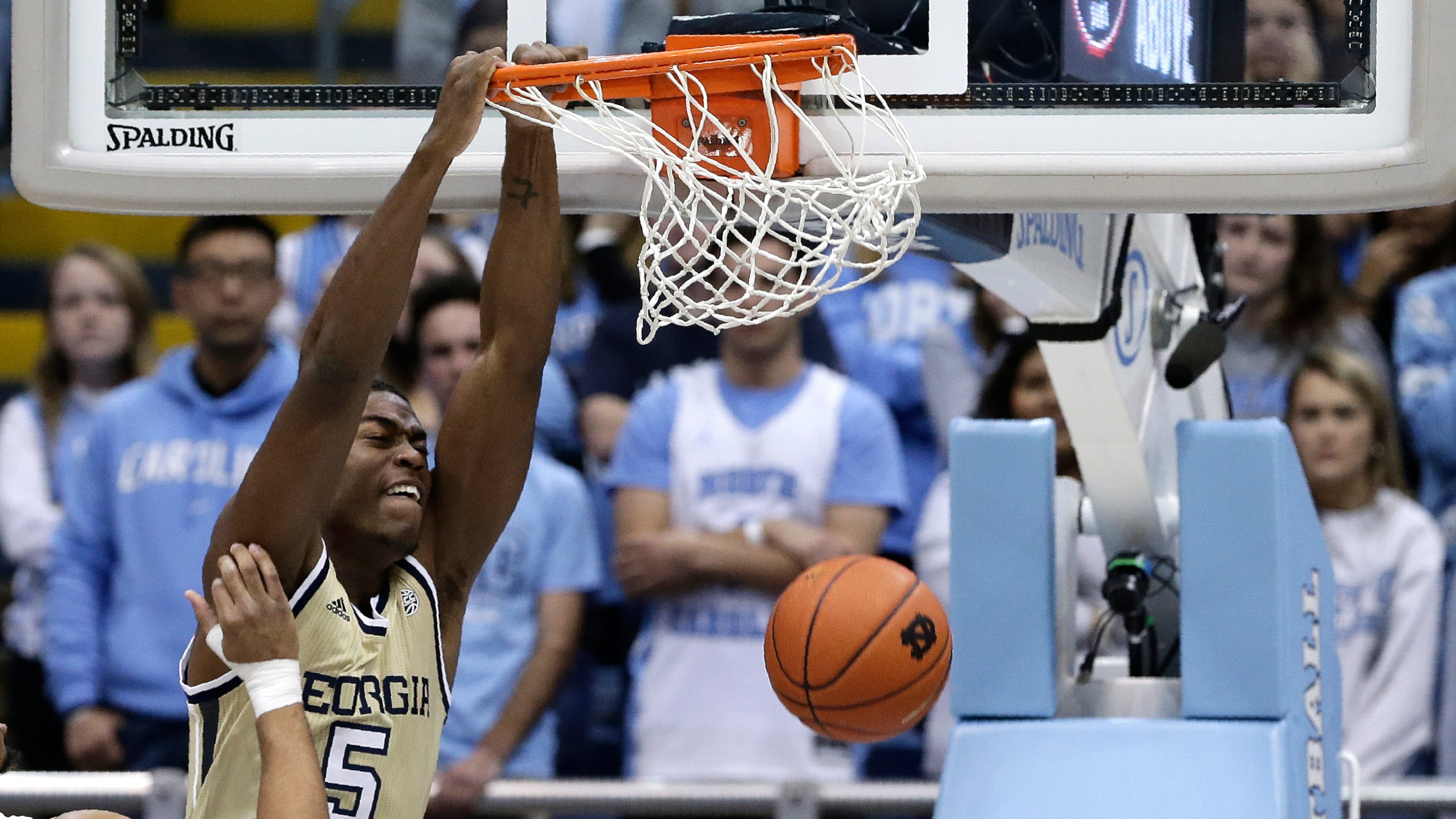The legendary career of Georgia Tech’s Moses Wright

Every up-from-oblivion story comes with a hook. Michael Jordan got cut from his high school team as a sophomore. Tim Duncan turned to basketball because the swimming pool he’d been using at his home in the Virgin Islands was destroyed by Hurricane Hugo. Hakeem Olajuwon had the greatest footwork of any big man ever because he’d spent his early years playing soccer.
Every up-from-oblivion story also carries a hint of mystery: If you’re this good now, why didn’t anybody see it sooner? Georgia Tech’s Moses Wright has authored one of the more stirring tales of the athletic century, having grown from “zero-star recruit,” to invoke Josh Pastner’s boilerplate description, to the player of the year in the conference that cares most about the sport. But for all the column inches devoted to Wright’s rise, some questions remain. Did he really play only one year of high school ball? Did he never bounce a basketball until he was beyond his 16th birthday?
Esteemed AJC colleague Ken Sugiura sought to clarify the issue on Tech’s Zoom call Monday, an hour after Wright was named the ACC’s POY. Having been asked such questions before, Wright played it coy: “How should I answer this time?” Then he mentioned that he’d played AAU ball before he joined the team at Enloe High in Raleigh. After some bemused back-and-forthing, Wright said, “Let’s go with six” — as in years of his actual roundball-playing.
From John Ford’s 1962 classic “The Man Who Shot Liberty Valance:” “This is the West, sir. When the legend becomes fact, print the legend.”
A 2017 profile by Jonathan M. Alexander of the Raleigh News & Observer notes that Wright played for a home-school team as a high school junior, having played for the Enloe JVs the year before. The story also mentions that his mother, Calla, had taken him to the AAU Garner Road Basketball Club “to find a personal tutor to help him overcome his lack of basketball experience.”
This would seem to stretch his hoops-playing well beyond Wright’s six-year total and the five years Pastner invariably cites, but who cares? We’re printing the legend, and Moses Wright’s is among the most stirring in roundball annals. He walked away from tennis and swimming, his first-choice sports, to become an ACC colossus. Only he was a unanimous choice for this season’s all-conference team, this after not being named to either the ACC’s first or second preseason all-league teams in November.
Moses Wright stats
It’s also believed that Darryl LaBarrie — the former Tech assistant who resigned after it was revealed he took the big-time recruit Wendell Carter to a strip club, where alum Jarrett Jack paid for everything — was the only Division I representative to see much of anything in Wright. Alexander’s 2017 story mentions Charlotte, which is Division I, as having shown interest in Wright. His Rivals page also shows Kansas State and Saint Louis as suitors, but the consensus holds that only two schools offered a scholarship – Division II Catawba and the Georgia Institute of Technology.
Wright signed with Tech, not that anyone much noticed the no-star. (Though Rivals listed him as a 3-star.) He played as a freshman, though he spent much of the season in Pastner’s Breakfast Club, the early-morning sessions for players in need of development. Pastner recalls a game against Pitt in which Wright didn’t try to block a shot, inducing the coach to pull him and tell him, “You can’t play in this game.”
Wright’s numbers in Tech’s 2018 ACC Tournament loss to Boston College: 24 minutes, 0-for-6 shooting, 0-for-3 on 3-pointers, four fouls, two turnovers, six rebounds, zero points.
Wright’s numbers in Tech’s 2019 ACC Tournament loss to Notre Dame: 35 minutes, 12-for-18 shooting, seven rebounds, three assists, one turnover, 25 points.
Wright describes that as his breakout game, and it caught the eye of a correspondent who’d taken little notice of him until that night in Charlotte. In a midnight text exchange with Pastner afterward, these fingers typed: “When did you turn Moses Wright into Moses Malone?”
Wright averaged 13 points and seven rebounds as a junior, and there were games when he couldn’t be guarded. He scored 23 points against North Carolina, 33 against Syracuse. Not many cared. Tech was 6-6 in pre-conference play and was facing an NCAA Tournament ban to boot. (Oh, and there was no 2020 NCAA Tournament.)
As a senior, the same Wright was among the best half-dozen players in the land. Credit Pastner and his staff for authoring the most stirring chapter of player development this writer – who has covered college basketball since 1976 – has witnessed. Credit Wright for getting better than anyone dreamed he might. He arrived as a zero-star (according to 247 Sports, if not Rivals). He became a superstar.
For years we’ve criticized Pastner for not signing a difference-making recruit; turns out he had one on his roster all along. Moses Wright has had himself a legendary college career, and he still has the ACC and NCAA tournaments to go.

